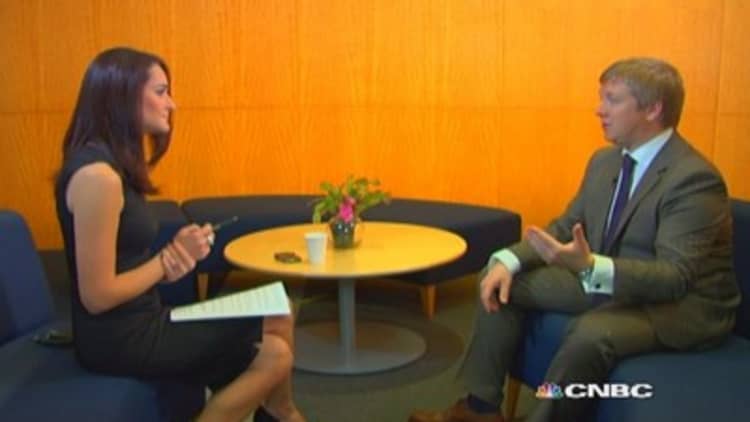Russian President Vladimir Putin has said the precipitous decline in oil prices is not a "tragedy" for the budget of his petro-state and its people.
That same day on Friday, Moody's downgraded Russia's debt ratings to Baa2 with a negative outlook, citing, among other things, the ongoing erosion of Russia's foreign exchange buffers due to low oil prices.
Experts who spoke with CNBC agreed that while Russia doesn't face a desperate budget situation now, it could face problems if the price of oil remains at recent lows—especially given new strains from a sliding ruble and expenses related to Crimea.
Lauren Goodrich, senior Eurasia analyst at Stratfor, said the official 2014 state budget accounted for oil at $114 per barrel. But because the state budget had a surplus by the fourth quarter, the budget required only about $93 a barrel in order to break even by the end of the year, Goodrich said.
Read MoreChina, Russia weigh on Philips earnings
The Russian Cabinet revised its break-even number for next year from $100 a barrel to about $90 a barrel.
The government has about $658 billion in cash reserves, and Goodrich said this amount is plenty to cover any budgetary shortfalls in the near future. With the ruble hitting record lows against the U.S. dollar and euro, however, the Kremlin is forced to prop up its currency as well.
"In the short term, the Kremlin can cover such shortfalls, even while the economy is in decline and under stress from lack of foreign investment," Goodrich said. "However, the longer oil prices stay below the $90 mark, the closer the Kremlin will get to a position of having to choose between what to spend its money on."
Read MoreIs the oil price fall more than just a coincidence?
Several weeks ago, the head of the Central Bank of Russia, Elvira Nabiullina, acknowledged that the country is working on a so-called "stress scenario" of economic development in the case of an even sharper drop in oil prices.
Though she and other Russian officials later backtracked, Nabiullina told Russian media that forecasting oil at $60 per barrel was a conceivable scenario.

The head of Russia's Ministry of Economic Development, Alexei Ulyukayev, said in an interview to domestic TV news channel "Russia 24" on the same day that he believes such a forecast is unrealistic, but he added that bracing for such possibilities would be a useful exercise nonetheless.
Alexander Kliment, a director of Russia and Emerging Markets Strategy at Eurasia Group, told CNBC that even with oil at $80 per barrel, the ruble is flexible enough to keep the budget in decent shape for a few years. He noted that "Russia has a ton of cash" and low debt levels compared to its gross domestic product.
Read MoreRussia downgrade: Can Putin shrug off the sanctions?
Aside from allocating cash for refinancing debt, defense spending, and pumping money into some of the country's largest companies like Rosneft and Novatek, the Kremlin also must consider the costs it faces as it tries to absorb Crimea.
Putin, for his part, told reporters that low oil prices might force Russian budget "corrections," but said the government would meet its social spending promises.
Such spending has increased by billions thanks Russia's annexation of Crimea. Kliment told CNBC that the existing budget draft earmarks about $2 billion per year for Crimea-related costs, though some experts put it at around $5 billion.
"That's not peanuts, but it's also not a crushing blow for a budget and economy of Russia's size," Kliment said.
"In a sense, it's more of a political issue than an economic one: At a time when the federal budget is cutting support for cash-strapped regional governments, Crimea is getting all this money. Sure it's patriotic and all, but at a certain point others will say, 'We want some of that, too.'"
'They don't want to go further in Ukraine'
Donald Jensen, senior fellow at Johns Hopkins University's Center for Transatlantic Relations, said the budget situation is part of a bigger picture that reflects what he calls the grinding down of an economy based largely on energy exports.
Though Jensen agreed that covering the costs of Crimea will not be a devastating blow to the budget, he pointed out that the costs of annexation are high.
"It's been more expensive, and that's one of the reasons they don't want to go further in Ukraine," Jensen said. "The Putin economic model had already begun winding down when he returned to the presidency, even before the crisis and the sanctions. This is a longer-term problem."


